20 December 2024, Baracoa to Moa, 27km (plus transport)
Hostal Estadio $21 (R388)We left Baracoa in leisurely fashion this morning knowing that the 72km to Moa could not be cycled and thinking we would take a slow ride for as many km as felt right then bum a ride. We did not bargain on a rough dirt road and virtually no vehicular traffic.
On the pedestrian street that runs from the cathedral door through the old town, we stopped at a
chocolateria for an obligatory cup of hot chocolate, cocoa/cacao being grown and processed locally. On the outskirts of town we passed the chocolate factory, a pleasant aroma wafting across the road and countryside.
*
CubaPrivateTravel.com:
"Cacao is an intrinsic part of the history of Central and South America. Its origins comes from the Olmecs, Mayans and Aztecs... It was introduced in Cuba by the Spanish in the 16th century. Although it wasn’t until 1771 that it reached a boom, with the arrival of French colonists from Haiti..."
"Milton Hershey made his fortune from making a delicacy for the wealthy — chocolate — into an affordable treat for the masses. He’d put his name on a model town in Pennsylvania built around his vision of scientific planning and corporate benevolence. With sugar prices peaking during World War I, he chose to build another all-American town. This time amid the oceanic sugar cane fields on the bluffs overlooking Cuba’s northwest coast. His greatest achievement was a state-of-the-art electric railway...
Hershey died in 1945, leaving no heirs and instructed his executives to sell off his Cuba holdings... Fidel Castro came into power in 1959. Then the Hershey mill was nationalized along with the railway... The mill began grinding toward a slow death, finally closed for good in 2003."
*
Also on the outskirts of Baracoa was a garage open 24/7 and advertising itself as offering "friendly" service. We could see it had an open shop and discovered it also had a relatively clean loo with running water. We went into the shop to see what it offered: lots of toilet paper and soap, canned fish and cartons of peach juice. We selected a juice and then encountered our first surly Cuban. A young woman who continued her slow written calculations on a form while we stood waiting to be served. When she finally looked up and told me the price, she rejected my offer of cash, saying they took cards only (we suspect she did not mean a credit card). This, and her attitude, hints at government ownership of the garage and shop - something we need still to confirm.
--
And then we were out of town, riding a beautiful coastline, our undulating road twisting to find the path of least resistance over spurs between which run rivers to the sea.
When we'd had enough, we joined a gaggle of gossiping locals at a village bus stop, having been assured that a camion would pass by... After an hour, a younger man came over and assured us we had better get on the bikes as there was no transport going our way.
We knew with certainty we could not manage another 45km and determined that though we would make a start, we would wave down literally anything on four or more wheels headed our way.
With a stroke of incredible luck we stopped a double-cab Toyota bakkie containing one man, three women and one freshly-caught pink fish, mouth agape. At first they said there was no room for us and the bikes. We accepted their verdict and let them go. Just metres later they slowed to a stop and with some ingenuity squeezed me and the two bikes and panniers in the back, and Charl in with the girls.
The 40-plus km to Moa was a rough, rough hour, but we were dropped a block from our casa, absolutely thrilled to encounter yet again the kindness of strangers.
--
Coming into Moa, Charl saw much more from his position on the back seat of the Toyota than I did wedged midst the bikes - one pedal tucked under my left armpit, and oily detritus belonging to the driver. Before you ask, there was room at the back for a short person (me), not a long one (Charl). My feet were literally wedged upright against the closed tailgate.
Between us, though, this is what we saw at the tail-end of our drive: We passed a sizeable harbour with a large ore-bearing ship parked there. We passed a nickel mine, previously American-owned, now a joint venture between Cuba and a Canadian company, Sherritt. If anyone enters a joint venture with Cuba involving previously-American-owned property, they are subject to court action. Seems the Americans and Sherritt made a deal, though their representatives in the US were banned from the States. One quarter of the world’s nickel supply is found along an 80km stretch outside Moa. We passed the airport. We passed a series of apartment blocks in a terrible state of disrepair, and people trawling a rubbish dump. We passed a grove of trees with large leaves, whose white undersides mimic flocks of birds perched in the branches.
--
Our casa accommodation, occupying the top floor of an old double-storey house, the ground floor being home to a professor of music, was fairly basic, but clean. The hostess, Ana, and her diffident son, Lorenzo, have two rooms to rent, but also run a fairly classy little restaurant on site. We were served a delicious dinner of spicy shrimps, and treated to cups of strong black coffee.
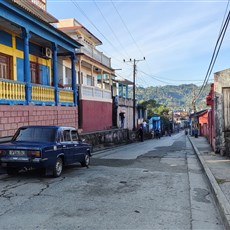
Leaving Baracoa
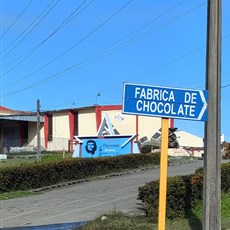
Leaving Baracoa
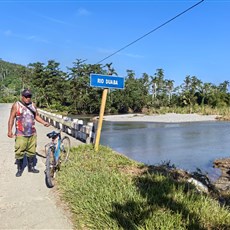
Baracoa to Moa
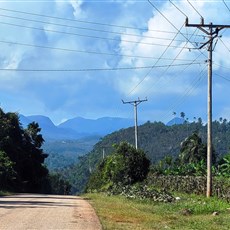
Baracoa to Moa
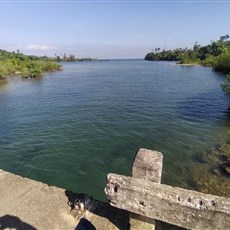
Baracoa to Moa
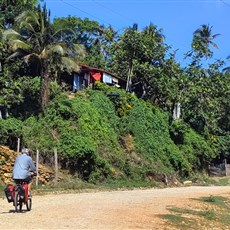
Baracoa to Moa
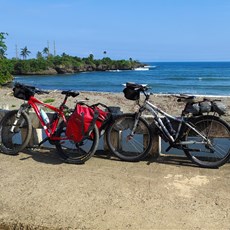
Baracoa to Moa
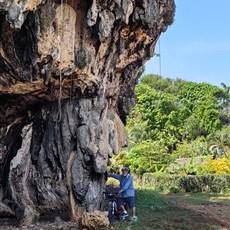
Baracoa to Moa
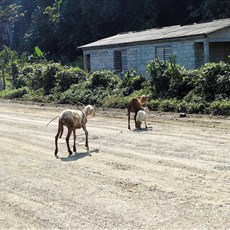
Baracoa to Moa
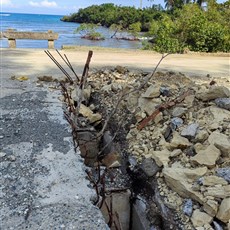
Baracoa to Moa
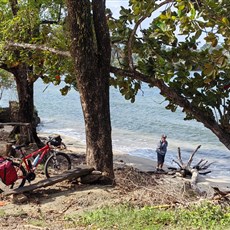
Baracoa to Moa
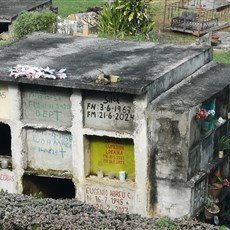
Baracoa to Moa
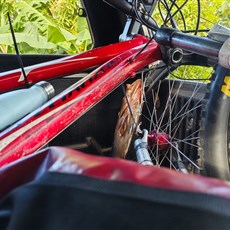
Baracoa to Moa
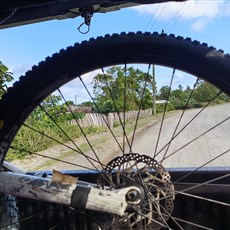
Baracoa to Moa